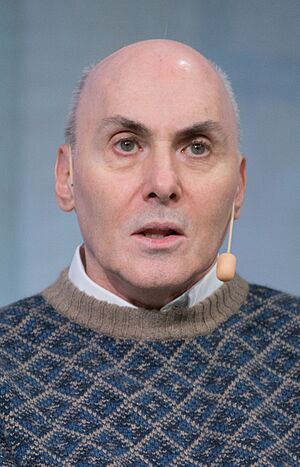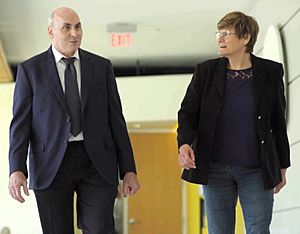Drew Weissman facts for kids
Quick facts for kids
Drew Weissman
|
|
|---|---|

Weissman at 2024 Nobel Week
|
|
| Born | September 7, 1959 Lexington, Massachusetts, U.S.
|
| Education | |
| Known for | Modified mRNA technologies used in COVID-19 vaccines |
| Awards |
|
| Scientific career | |
| Fields | Immunology |
| Institutions | University of Pennsylvania |
| Thesis | Regulation of b lymphocytes with reagents that cross-link surface immunoglobulin (1987) |
| Doctoral advisor | Ann Marshak-Rothstein |
Drew Weissman (born September 7, 1959) is an American doctor and scientist. He is famous for his important work on RNA biology. RNA is like a messenger molecule in our bodies.
Dr. Weissman is a professor at the Perelman School of Medicine at the University of Pennsylvania. He also leads the Penn Institute for RNA Innovation. His research helped create mRNA vaccines. These vaccines became well-known for fighting COVID-19.
In 2023, Dr. Weissman and Katalin Karikó won the Nobel Prize in Physiology or Medicine. They received this award for their discoveries about how to change RNA. These changes made effective mRNA vaccines possible. Dr. Weissman has also won many other awards for his scientific contributions.
Contents
Early Life and Education
Drew Weissman was born in Lexington, Massachusetts, on September 7, 1959. His parents were Hal and Adele Weissman. He grew up in Lexington and went to Lexington High School. He graduated from high school in 1977.
Dr. Weissman studied at Brandeis University. He earned his Bachelor of Arts and Master of Arts degrees in 1981. He focused on biochemistry, which is the study of chemical processes in living things.
He then went to Boston University for his advanced degrees. He earned both his Doctor of Medicine (M.D.) and Doctor of Philosophy (Ph.D.) in 1987. After that, he completed a residency at Beth Israel Deaconess Medical Center. He also did a fellowship at the National Institutes of Health (NIH).
Scientific Career and Discoveries
In 1997, Dr. Weissman joined the University of Pennsylvania. He started his own lab there to study RNA and the body's immune system. Today, he is a leading professor in vaccine research at the university.
At the university, Dr. Weissman met Katalin Karikó. They both shared an interest in RNA research. They also found it hard to get money for their work. Dr. Weissman, who studied vaccines, teamed up with Dr. Karikó, a biochemist.
They began working together to advance RNA technology. One big challenge was that RNA often caused unwanted immune reactions. In 2005, they found a way to change RNA using special molecules. This stopped the body from reacting badly to the RNA. This discovery was very important for using RNA in medicines.
Dr. Weissman and Dr. Karikó also found a way to deliver mRNA safely. They put the fragile mRNA inside tiny fat bubbles called lipid nanoparticles. This system protects the mRNA until it reaches the right part of the body. They showed that this delivery method worked well in animals.
In 2006, they started a company called RNARx. Their goal was to create new RNA treatments. Their modified RNA technology became a key part of the Pfizer/BioNTech and Moderna COVID-19 vaccines. These vaccines were used worldwide during the COVID-19 pandemic.
Dr. Weissman's lab continues to research mRNA technology. They are working on new vaccines for diseases like influenza and herpes. They also hope to use mRNA for gene editing and other treatments.
Awards and Recognition
Dr. Weissman and Dr. Karikó have received many awards for their mRNA work. These include the 2023 Nobel Prize in Physiology or Medicine. They also won the 2020 Rosenstiel Award and the Lasker-DeBakey Clinical Medical Research Award.
In 2021, Dr. Weissman received the Princess of Asturias Award for Scientific Research. In 2022, he was awarded the Breakthrough Prize in Life Sciences. He also received the Japan Prize and the Robert Koch Prize.
He was elected to the National Academy of Medicine and the American Academy of Arts and Sciences in 2022. In 2023, he received the Harvey Prize. People from all over the world send him fan mail. They thank him for his work that made the COVID-19 vaccine possible.
Patents and Impact
Dr. Weissman is listed as an inventor on several patents. These patents describe how to modify RNA for vaccines and other treatments. These patents were later licensed to companies like Moderna and BioNTech. This allowed them to use the technology in their COVID-19 vaccines.
Dr. Weissman's work has had a huge impact on global health. It has opened new doors for creating vaccines and other medicines.
See also
 In Spanish: Drew Weissman para niños
In Spanish: Drew Weissman para niños
 | John T. Biggers |
 | Thomas Blackshear |
 | Mark Bradford |
 | Beverly Buchanan |


